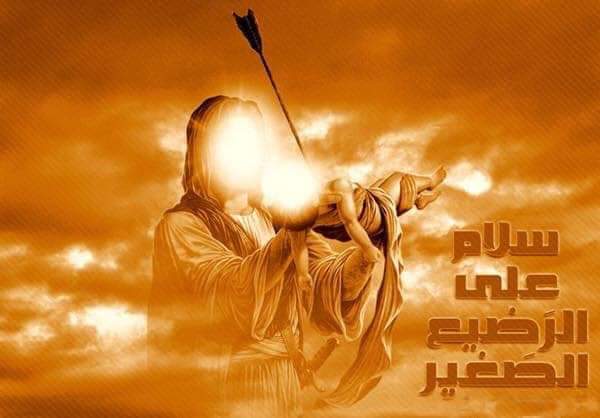Karbala, almost two or three years ago, a video of Speaker Iqbal Hussain Shah Bajar, a Punjabi Speaker, passed by sight, without first seeing it, but then did not know why started watching. He mentioned in the Punjabi language what the difference is in the action and reaction. To illustrate, slapping a child’s face is a process of action; you have the option; if you wish, do not do so. But the child will cry and laugh, this is his reaction and you have no control over the reaction. If you want this baby to not cry, you have to stop the process that made the baby cry.
The innocent child was slaughtered in Karbala; their fathers’ head were slaughtered in front of innocent children. It was an action. Now, the response will continue until the Day of Judgment. Mourning is the name of retaliation against this atrocity. It was not possible to stop the reaction; it is not possible to stop the reaction.
After this, Iqbal Hussain Shah started to say that the deceased’s heirs handle everything attributed to their loved one. So, that he can present it whenever he needs proof. “God is Witness. We have kept the Flag of Abbas, the Dhu’l-Jannah of Hussein and the cave of Asghar.” Just in the hope that the owner’s court will ever appear. He will ask for proof and we will present Ali Asghar’s vacant seat. When asked why it is vacant, we will tell that the vacancy is because the “six-month-old baby” was brutally murdered.
This empty cave is exhibited today, remembering Ali Asghar around the world.
No other Punjabi or Seraiki Speaker has ever heard of the late Speaker Ahlibet Chaudhry Shujaar Hussein. However, this video of Iqbal Hussain Shah Bajar kept me sane for a while. These people publicly convey the big message in small metaphors. Their audience has a specific circle to which they have come to know God when they are publicly known. Village, village, and city to city. I wish they hadn’t gotten into the wrong elements.
Ali Asghar received only six months to live in the world, but today the world remembers Hussein’s first half as “Baab-ul-Hawaij”. Ali Asghar is the fourth person to be called “Baab-ul-Hawaij”, along with Imam Musa al-Kazim, Abul Fazl al-Abbas, and his mother Grammi Um Al-Benin. Just as the Flag of Abbas and one of the little ones associated with that Flag is identified with Abbas and Sakina, so is the identity of Ali Asghar, the empty cave. Through this empty cave, God gives children to the offspring, heals the sick, and accepts the needs of the needy. There is hardly any profession in which there is no empty cave of Asghar.
Whether it is the occasion of Ali Asghar, the Indian subcontinent or any country in the world, in Karbala, you will see an empty cave everywhere. The lioness that was killed by thirst, today, when the procession of visiting her cave shrines, water, syrup, and milk is everywhere. So that no one thirsting for this thirsty infant would be thirsty.
The event is a very important part of the ocean in the sea of vibrant emotions and emotions within Karbala. When he turned his tongue over his dry lips and looked at Lashkar-e-Yazid, they also started to cry. Today, when I see the sorrows scattered all over the place, I think powerless that they are probably even more muscular than the soldiers of Lashkar-e-Yazid, whose hearts were gone for a few moments, even for a moment. When I see these nuns who call themselves Muslims, they are reminded of the Hindus who mourn when they read such verses:
“In my heart, I used to sleep in life
From Shabbir Madinah, the Gurus came to India
There is no call, water in Sansar
Two drops if the wrongdoer were given to Asghar. “
There is also a process in the Day of Ashur that says seven times اِنَّا لِلّٰہِ وَ اِنَّااِلَیہِ رَاجِعُونَ رِضاً بِقَضَائِہِ وَ تَسلِیماً لِاَمرِہ and then goes back and forth. In childhood, my mother used to say اِنَّا لِلّٰہِ وَ اِنَّااِلَیہِ رَاجِعُونَ رِضاً بِقَضَائِہِ وَ تَسلِیماً لِاَمرِہ . Sometimes stand with us, doing these things, but after saying and going back and forth seven times, she would constantly cry and wipe her tears.
When something big happened, he heard in distress that when Imam Hussein returned with the arrow in the neck of Asghar instead of the water. He went forward seven times اِنَّا لِلّٰہِ وَ اِنَّااِلَیہِ رَاجِعُونَ رِضاً بِقَضَائِہِ وَ تَسلِیماً لِاَمرِہ ہ to enter the tent, and returned seven times, to a tent. Ali Asghar’s mother Umm Rabab was present. People say it was a war of power. Seriously! with a hand on the heart and say, was this war of power?
After reading the troubles of Ali Akbar, Ayatollah Nayeni saw Imam Hussein with a body covered with arrows in the dream. And the next day after reading the troubles of Abul Fazl al-Abbas. He saw only two arrows on the body of Abdullah. On being asked, it was said that all the arrows of the archangels were shed, only that the arrow of Akbar and Abbas would never come out. After reading this episode I was wondering if Ali Asghar’s arrow might have even gone out? And then remembered the burial of the powerless Ali Asghar at Karbala.
(Imam Hussein has buried his “six months old” with him, in his chest.)
” اِنَّا لِلّٰہِ وَ اِنَّااِلَیہِ رَاجِعُونَ رِضاً بِقَضَائِہِ وَ تَسلِیماً لِاَمرِہ “


